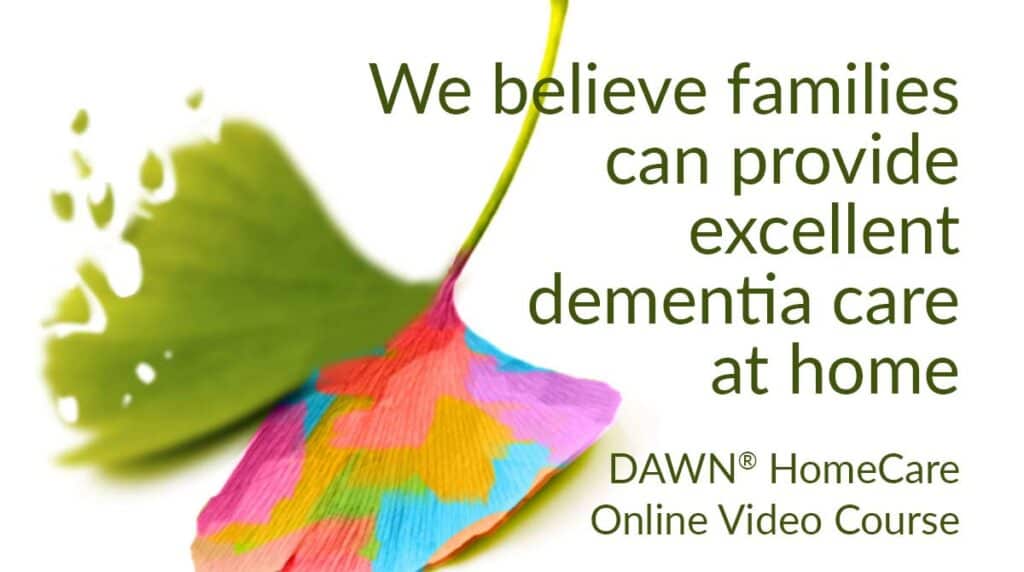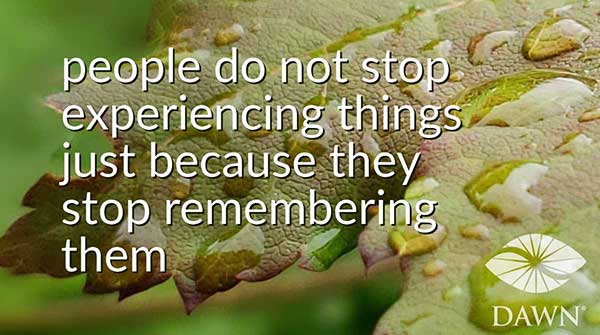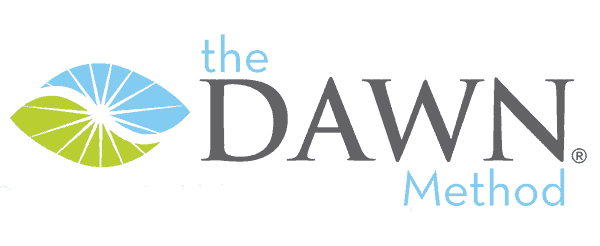One of the most important things for us to understand if we spend time with people experiencing dementia or Alzheimer’s is the difference between the remembering self and the experiential self. For some reason, it’s easier for us to grasp having a remembering self and harder for us to imagine the experiential self—that part of us that continues to experience and respond to things, despite dementia.
The great truth is that when someone is experiencing dementia, although they are losing memories and the ability to remember, they are not losing awareness of the present or the ability to experience what takes place in the present.
The remembering self is being lost to dementia
I think of my remembering self as the part of me that has memory skills, such as the ability to use recall to search for and retrieve things that I’ve experienced in the past. It is also the part of me that feels nostalgia and familiarity and likes to reminisce with loved ones about the good times we’ve enjoyed together. Other memories are less fun to recall, and those are also a part of my remembering self. Our remembering selves are the sum of our memory skills, our experiences and memories from the past, and the good and bad feelings we have about them.
For people with healthy brains, the remembering self is alive and well—as is the experiential self.
The experiential self will never be lost to dementia or Alzheimer’s
Our experiential selves are the part of us that exists in the present and takes in all the diverse information provided by our senses. I may jump at a loud sound, feel a surge of pleasure when a song I love comes on the radio, realize I am feeling hunger pangs, feel a sneeze coming on—myriad stimuli happen and occur in our presences and in the present, and we experience all of them.
With my healthy brain, I might jump at a loud noise, but I then use memory and rational thought to identify or interpret the reason for the noise. I recall the sound of my tea kettle whistling or the door slamming and don’t feel alarmed. With my healthy brain, I can also choose to tune out the present and the constant sensory data coming at me to focus on a memory or on something I anticipate happening in the future.

For people experiencing dementia, who are losing memory and rational thought, it’s not as easy to escape the present. Their remembering selves with their memories and memory skills are fading. Their rational thought skills are failing, making them increasingly unable to interpret the sensory data being received moment by moment.
And the sensory data continues, in a constant stream. That’s why it’s so important that we, as their caregivers, understand what the experiential self continues to do. The experiential self continues to experience everything in the present, in their presence.
Living with the experiential self alone
Although our loved ones and clients are not able to recall, interpret or express ideas regarding their experiences, they are still having experiences. Their experiences will be causing them pain and relief, happiness and sadness, fear and anger—just like ours cause us. But they are becoming ever less able to choose to avoid it, to leave the present for a happier memory or anticipate a hopeful future.
When someone is experiencing dementia, we need to be careful that we treat them respectfully and kindly at all times. We need to understand that whatever they experience—whether or not they can recall or recount it later—they are reacting to it. Our loved ones with dementia become unable to describe how they feel, but they never stop feeling.

§
Sign up for our newsletter and free video series
Sign up for our monthly newsletter and get more advice on how to help someone experiencing dementia. As a bonus, you’ll get our free video series, “Preparing for Dementia.”

